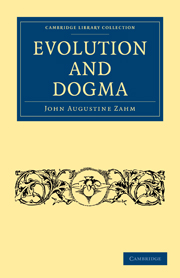Book contents
- Frontmatter
- PREFATORY NOTE
- Contents
- INTRODUCTION
- PART I EVOLUTION, PAST AND PRESENT
- PART II EVOLUTION AND DOGMA
- CHAPTER I MISCONCEPTIONS OF THEORY, ERRORS IN DOCTRINE AND MISTAKES IN TERMINOLOGY
- CHAPTER II MONISM AND EVOLUTION
- CHAPTER III AGNOSTICISM AND EVOLUTION
- CHAPTER IV THEISM AND EVOLUTION
- CHAPTER V THE ORIGIN AND NATURE OF LIFE
- CHAPTER VI THE SIMIAN ORIGIN OF MAN
- CHAPTER VII TELEOLOGY, OLD AND NEW
- CHAPTER VIII RETROSPECT, REFLECTIONS AND CONCLUSION
- AUTHORS AND WORKS CITED IN “EVOLUTION AND DOGMA.”
- GENERAL INDEX
CHAPTER I - MISCONCEPTIONS OF THEORY, ERRORS IN DOCTRINE AND MISTAKES IN TERMINOLOGY
Published online by Cambridge University Press: 29 August 2010
- Frontmatter
- PREFATORY NOTE
- Contents
- INTRODUCTION
- PART I EVOLUTION, PAST AND PRESENT
- PART II EVOLUTION AND DOGMA
- CHAPTER I MISCONCEPTIONS OF THEORY, ERRORS IN DOCTRINE AND MISTAKES IN TERMINOLOGY
- CHAPTER II MONISM AND EVOLUTION
- CHAPTER III AGNOSTICISM AND EVOLUTION
- CHAPTER IV THEISM AND EVOLUTION
- CHAPTER V THE ORIGIN AND NATURE OF LIFE
- CHAPTER VI THE SIMIAN ORIGIN OF MAN
- CHAPTER VII TELEOLOGY, OLD AND NEW
- CHAPTER VIII RETROSPECT, REFLECTIONS AND CONCLUSION
- AUTHORS AND WORKS CITED IN “EVOLUTION AND DOGMA.”
- GENERAL INDEX
Summary
Evolution of the Evolution Theory
IN the preceding pages we have considered what might be termed the evolution of the theory of Evolution. We traced its development from its earliest germs, as disclosed in the speculations of Hindu and Greek philosophy, and reviewed some of the evidence ordinarily adduced in its support, as well as the objections which are commonly urged against its acceptance. We also adverted to some of the many attempted explanations of Evolution, which have been proposed since the publication of Darwin's “Origin of Species,” and noted the wide divergence of views which obtains respecting some of the most fundamental elements of the theory. We learned that the great majority of contemporary scientists are believers in some theory of organic Evolution; that the controversy is no longer about the fact of Evolution—that being assumed, if not demonstrated—but rather regarding the factors which have been operative in the onward march of animal and vegetable life, and the processes which have characterized organic development in its divers phases and epochs. We may not be prepared to go the same lengths as do Spencer, Huxley and Fiske, in the demands which they make for Evolution as the one controlling agency in the world of phenomena; we may refuse assent to the theories of Darwin, Mivart, Cope, Brooks, Weismann, Nägeli and others; but it seems difficult, if not impossible to ignore the fact that some kind of Evolution has obtained in the formation of the material universe, and in the development of the divers forms of life with which our earth is peopled.
- Type
- Chapter
- Information
- Evolution and Dogma , pp. 205 - 229Publisher: Cambridge University PressPrint publication year: 2009First published in: 1896



